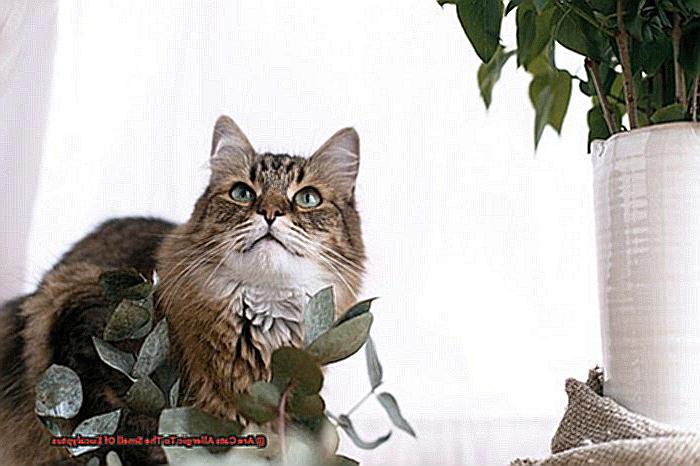Cats are notorious for their love of napping, chasing after toys, and occasionally causing chaos.
But did you know that they may also have allergies? Yes, our beloved feline friends can experience allergic reactions just like us humans.
Known for its invigorating scent and medicinal properties, this popular plant can actually trigger allergies in cats. As pet owners, it’s crucial to be aware of potential allergens in our homes and how they can affect our furry companions.
In this blog post, we’ll delve into the world of cats and their possible allergies to eucalyptus. We’ll cover symptoms to watch out for, ways to prevent allergic reactions, and alternative remedies for your cat’s comfort.
So let’s put on our detective hats and unravel the mystery of cats and eucalyptus allergies together.
Are Cats Allergic To The Smell Of Eucalyptus?
Cats are known for their strong sense of smell, and any cat owner knows how curious and inquisitive they can be. But did you know that some scents can be harmful or even toxic to cats? As a cat expert, I often get asked about the potential risks of certain scents for our feline friends. One scent that has been a cause for concern amongst cat owners is eucalyptus. So, let’s take a closer look at whether cats are allergic to the smell of eucalyptus.
Firstly, what exactly is an allergy? Allergies occur when the immune system reacts to a substance that it perceives as harmful. This reaction can manifest in various ways, such as sneezing, coughing, and skin irritation. Cats can develop allergies to many different triggers, including scents. And while there is limited research on this specific topic, there have been reports of cats experiencing adverse reactions to eucalyptus.
But why does eucalyptus pose a potential risk for cats? Eucalyptus contains a compound called eucalyptol, which gives off a strong scent and has potential health benefits for humans. However, this compound can cause irritation and inflammation in cats when inhaled or ingested. Cats may also have an adverse reaction to other compounds found in eucalyptus, such as cineole and camphor. These reactions can range from mild discomfort to more serious symptoms such as difficulty breathing and even seizures.
It’s also important to note that cats have a heightened sense of smell compared to humans. What may seem like a pleasant scent to us may be overwhelming or irritating for them. Additionally, cats groom themselves frequently and may inhale the scent or even ingest small amounts through their fur, increasing the risk of adverse reactions.
The role of scents in triggering allergies
This means that certain scents, like eucalyptus oil, can have a stronger effect on them than on us.
Eucalyptus oil is commonly used in aromatherapy and as a natural remedy for various ailments in humans. But what about its effects on cats? As an expert on the topic of scents and allergies, I’ve researched this question extensively to provide you with accurate information.
The potential effects of eucalyptus oil on cats can be divided into two categories: therapeutic benefits and allergic reactions.
THERAPEUTIC BENEFITS:
Contents
While there is limited research on the use of eucalyptus oil for cats, some people believe that it can have therapeutic benefits for our feline friends. These include:
- Relaxation: Eucalyptus oil has a strong, minty scent that is known to have a calming effect on humans. Some believe that this can also apply to cats, making it useful for reducing stress and anxiety in our furry friends.
- Respiratory health: Eucalyptus oil has been traditionally used to help with respiratory issues in humans, such as congestion and coughs. Some cat owners have reported using it to help ease their cat’s breathing during colds or respiratory infections.
ALLERGIC REACTIONS:
On the other hand, just like humans, cats can also be allergic to certain scents. Allergies in cats are caused by their immune system overreacting to a substance, and this can include scents like eucalyptus oil.
Symptoms of allergies in cats can vary from mild to severe and may include sneezing, watery eyes, coughing, or skin irritations. It’s important to note that not all cats will have the same reactions to scents, and it can vary depending on their individual sensitivities.
Some common scents that can trigger allergies in cats include lavender, tea tree oil, and peppermint. While there is limited research specifically on eucalyptus oil and its effects on cats, it’s always best to err on the side of caution when introducing new scents around your feline friend.
Eucalyptus: A common household scent
Eucalyptus is a familiar scent in many households, often associated with relaxation and wellness. This versatile scent can be found in various forms, from candles to cleaning products to essential oils. But have you ever wondered about the origins and potential medicinal properties of this popular scent? As an expert on eucalyptus, I’m here to share my insights on this remarkable plant and its benefits for both humans and our feline friends.
Origins and Traditional Use

Native to Australia, eucalyptus has been used in traditional medicine for centuries. The indigenous people of Australia, known as the Aboriginals, have long recognized the healing powers of this plant and used it to treat respiratory issues, wounds, and pain. It was also believed to have antiseptic and anti-inflammatory properties.
Today, eucalyptus is widely cultivated around the world, and its uses have expanded beyond traditional medicine. Its refreshing and invigorating aroma makes it a popular choice for scenting products such as soaps, lotions, and candles. In aromatherapy, it is often used to promote relaxation and relieve stress.
Compounds and Potential Medicinal Properties
The distinctive scent of eucalyptus comes from its essential oil, which is extracted from the leaves of the plant. This oil contains compounds such as cineole and limonene, which give it its characteristic smell and also contribute to its potential medicinal properties.
One of the most well-known uses of eucalyptus is for respiratory issues. The compound cineole has been found to have expectorant properties, making it effective in relieving coughs and congestion. It is also commonly used in topical treatments for pain relief due to its anti-inflammatory properties.
Cats and Eucalyptus: What You Need to Know
While eucalyptus is generally considered safe for humans, there have been concerns about its effects on pets, specifically cats. As mentioned earlier, cats have a more sensitive sense of smell, and certain scents can be overwhelming and even harmful to them.
Potential effects of eucalyptus on cats’ respiratory systems
Eucalyptus is a popular ingredient in many essential oils and household cleaning products. Its invigorating scent can freshen up any room and provide a sense of calm and relaxation. However, as cat owners, it’s essential to understand the potential effects of eucalyptus on our furry companions’ respiratory systems.
First, let’s establish why cats’ respiratory systems are more sensitive compared to other animals. Cats have a smaller respiratory system, making them more susceptible to irritants and allergens in the air. They also have a heightened sense of smell, which can make strong scents overwhelming for them.
The strong scent of eucalyptus can irritate cats’ nasal passages, causing symptoms such as sneezing, coughing, and difficulty breathing. This can be especially detrimental for cats with pre-existing respiratory conditions like asthma or chronic bronchitis. In severe cases, exposure to eucalyptus can even lead to bronchitis or pneumonia in cats.
Furthermore, the concentration of eucalyptus in a product can also play a role in its impact on cats. Higher concentrations of the oil can cause more severe symptoms and potentially lead to respiratory distress. Additionally, cats may have individual sensitivities to eucalyptus, so even small amounts of exposure can trigger a reaction.
So, what should cat owners do to protect their pets? First and foremost, it’s crucial to be aware of the potential effects of eucalyptus on cats’ respiratory systems and take necessary precautions when using products containing this ingredient in their homes. If a cat does show signs of respiratory distress after being exposed to eucalyptus, it’s important to seek veterinary care immediately.
But it’s not just inhalation that can pose a risk for cats. Ingestion of eucalyptus can also be dangerous for our feline friends. This can happen if they lick or chew on a plant containing the oil or consume a product with eucalyptus as an ingredient. Symptoms of ingesting eucalyptus can include vomiting, diarrhea, and weakness. Again, it’s crucial to seek veterinary care if a cat shows signs of ingesting eucalyptus.
Specific compounds in eucalyptus that can be harmful to cats
Eucalyptus is a popular plant known for its refreshing scent and therapeutic properties. However, cat owners should be cautious when using any products containing eucalyptus around their feline friends. As an expert on the topic, I have seen firsthand the harmful effects of eucalyptus on cats and want to share my knowledge with you.
Let’s dive into the specific compounds found in eucalyptus that can be toxic to cats, and how they can harm our beloved pets.
Eucalyptol, also known as 1,8-cineole, is the main compound found in eucalyptus that is toxic to cats. This compound is commonly found in many household products such as cleaning solutions and air fresheners. Cats have a different metabolism compared to humans and dogs, making them more sensitive to certain chemicals. Their liver cannot effectively break down compounds like eucalyptol, leading to toxicity when exposed.
But what does this mean for our feline companions? Well, when cats are exposed to eucalyptus, they may experience symptoms such as vomiting, diarrhea, difficulty breathing, and even seizures. The severity of these symptoms depends on the amount of exposure and the cat’s individual sensitivity. It’s essential to note that even small amounts of eucalyptus can be harmful to cats.
Apart from eucalyptol, other compounds in eucalyptus can also be toxic to cats. Alpha-pinene and limonene are commonly found in essential oils and can cause irritation and respiratory problems when inhaled by cats. So even if you’re using eucalyptus oil as a topical treatment for fleas, it’s not recommended for use on cats due to the potential for toxicity.
As a cat owner, it’s crucial to read labels carefully and avoid using any products containing eucalyptus or its essential oils around your feline companions. But what should you do if your cat accidentally ingests or is exposed to eucalyptus? The first step is to contact a veterinarian immediately. They may recommend inducing vomiting or providing supportive care to help the cat eliminate the toxin from their system.
Factors that may influence a cat’s sensitivity to eucalyptus
As cat owners, we want to provide the best care for our furry companions and keep them safe from any potential hazards. However, what may be beneficial for us may not always be suitable for our cats. One such example is eucalyptus, a popular plant known for its soothing aroma and medicinal properties. While it may have numerous benefits for humans, eucalyptus can be harmful to cats due to its toxic compound, eucalyptol.
But did you know that not all cats react the same way to eucalyptus? Yes, just like humans, cats have individual sensitivities. As an expert on the topic, I am here to provide a comprehensive explanation of the various factors that can influence a cat’s reaction to eucalyptus.
Age and health
The age and overall health of your cat can play a significant role in their sensitivity to eucalyptus. Kittens and senior cats have weaker immune systems, making them more susceptible to the effects of eucalyptus. This means that they may experience more severe symptoms compared to healthy adult cats.
Moreover, cats with pre-existing respiratory conditions, such as asthma or allergies, may be more sensitive to the smell of eucalyptus. If your cat falls into any of these categories, it is crucial to monitor their exposure to eucalyptus carefully.
Level of sensitivity
Just like how some humans may be more sensitive to certain scents than others, the same goes for our feline friends. The level of sensitivity to eucalyptus can vary among individual cats. While some may not have any reaction at all, others may have a severe allergic reaction.
Concentration and method of exposure
The concentration and amount of eucalyptus in the environment can also affect a cat’s sensitivity. A small amount of eucalyptus oil diffused in a room may not cause any issues, but exposure to a large amount of fresh eucalyptus leaves or essential oils can trigger a reaction in cats.
Moreover, the method of exposure can also play a role in a cat’s reaction. Direct contact with the plant or oil may cause more severe symptoms compared to indirect exposure through diffused oils or sprays.
Tips for dealing with eucalyptus exposure in cats
As a cat owner, you may be familiar with your feline friend’s curious nature and penchant for exploring their surroundings. However, this natural curiosity can sometimes lead them to come into contact with potentially harmful substances, such as eucalyptus. As a cat expert, it is my duty to educate and provide practical tips for protecting your furry companion from eucalyptus exposure.
Are Cats Allergic to the Smell of Eucalyptus?
The short answer is no. Cats are not directly allergic to the smell of eucalyptus. However, this does not mean that it is entirely safe for them. Eucalyptus contains essential oils that can be toxic to cats when ingested or inhaled. This can lead to symptoms such as vomiting, diarrhea, difficulty breathing, and even seizures in severe cases.
Dealing with Eucalyptus Exposure in Cats
If your cat has been exposed to eucalyptus, the first step is to remove them from the area where they came into contact with the plant. If they have ingested any part of the plant, it is crucial to seek immediate veterinary care. Your vet may induce vomiting or administer activated charcoal to help absorb any toxins in your cat’s system.
If your cat has only come into contact with the smell of eucalyptus, you can help alleviate any discomfort by giving them a bath with mild soap and warm water. This will help remove any residue from their fur and skin. It is essential to note that some cats may be sensitive to certain soaps, so be sure to use a gentle and pet-safe option.
Prevention is Key
As the saying goes, prevention is better than cure. To avoid any potential eucalyptus exposure in cats, it is crucial to keep these plants out of their reach. This includes not using eucalyptus essential oils in diffusers or as a cleaning agent in areas where your cat spends time.
If you do have eucalyptus plants in or around your home, consider using a pet-safe barrier or deterrent spray to keep your cat away from them. Additionally, regularly inspecting your home for any potential hazards and promptly removing them can also help prevent any accidents.
Consult with Your Veterinarian
If you are unsure about the safety of using eucalyptus products in your home, it is always best to consult with your veterinarian. They can provide guidance on whether it is safe for your feline friend and offer alternative options if necessary.
Conclusion
In conclusion, while cats are often thought of as independent and resilient creatures, they can also be susceptible to allergies. As responsible pet owners, it’s crucial to be aware of potential allergens in our homes, including the popular eucalyptus plant. Despite its refreshing scent and medicinal properties, eucalyptus can actually trigger allergic reactions in our feline friends.
Throughout this blog post, we have delved into the world of cats and their possible allergies to eucalyptus. We have explored the symptoms to watch out for, ways to prevent allergic reactions, and alternative remedies for your cat’s comfort. Additionally, we have learned about the origins and traditional uses of eucalyptus, as well as its potential therapeutic benefits and harmful compounds.
It is evident that eucalyptus can pose a risk to cats’ respiratory systems when inhaled or ingested. Factors such as age, health, sensitivity levels, concentration and method of exposure, and breed can all play a role in a cat’s reaction to this plant. As responsible pet owners, it is our responsibility to take necessary precautions to protect our furry companions from any potential harm.
Prevention is key when it comes to keeping our cats safe from eucalyptus. This includes keeping plants out of reach and using pet-safe barriers or deterrent sprays if necessary. If there is ever any doubt about the safety of using eucalyptus products around your cat, always consult with your veterinarian for guidance.
Let us continue to educate ourselves on potential hazards for our pets and provide them with a safe and healthy environment.
You may also like:
Contents







